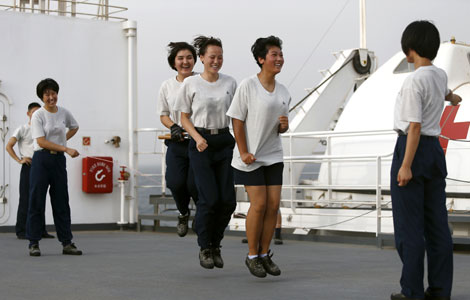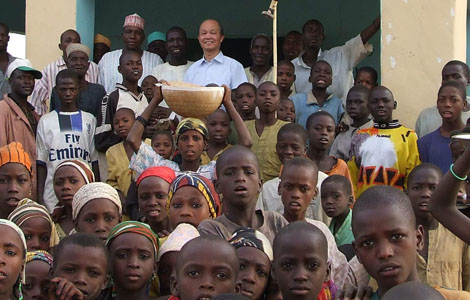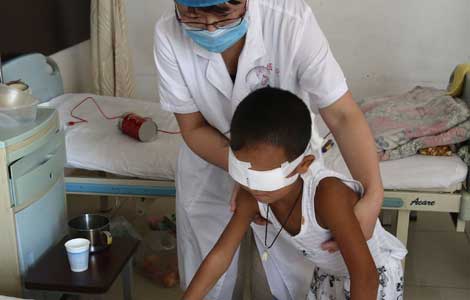'No way to reverse or even stop' reform: party
Updated: 2013-09-03 10:45
By Zhang Yuwei (China Daily)
|
||||||||

China's announcement last week that it would hold its third plenary session of the Communist Party of China (CPC) in November has drawn attention from pundits in the US, who see it as an occasion where "substantial" reforms will take place.
In a meeting last Tuesday, the Political Bureau of CPC Central Committee decided that the Third Plenary Session of the 18th CPC Central Committee will be held in November in Beijing to discuss major issues concerning comprehensive reform.
"There is no way for China to reverse or even stop the process," said the committee, adding that reform and opening up have "only a progressive tense, no perfect tense".
The November meeting takes place at a time when China faces economic and social challenges - including a slowdown in growth and corruption concerns - both are pressing issues for the new leadership to tackle.
"I believe that the leadership under President Xi Jinping and Premier Li Keqiang wants to inspire confidence at home and abroad in their ability to bring the Chinese economy onto a new innovation-driven, services-oriented growth platform," said Denis Simon, vice-provost for International Strategic Initiatives at Arizona State University.
The upcoming session will follow suit of previous third plenary sessions, which often saw "meaningful and substantial reform", said Jon Taylor, a professor of political science at University of St Thomas in Houston, adding the meeting will help to "flesh out" reforms the new leadership has indicated interest in.
"I think that we may very well see some hukou (China's household registration) reform, related directly to plans to encourage greater urbanization," said Taylor, adding that an easing of household registration would make that task much smoother.
The new leadership has also sent out signals of economic reforms.
"We'll see some substantial financial reforms, particularly allowing market-based interest rates, as well as the easing of some aspects of capital controls," noted Taylor.
"Further, I think that we'll see a proposal to reform state-owned enterprises, as well as some privatization proposals," he added.
Simon agrees. "The economy needs to rebalance the current focus on state-owned enterprises and give greater emphasis to the nurturing and development of small and medium enterprises," he said.
Simon thinks the new leadership is also likely to put more emphasis on tertiary industries, including high-end services, as a way to advance the economy and go beyond the previous emphasis on manufacturing.
Taylor said the most urgent social-economic issues include linking local government debt audits to Party and State disciplinary structures, strengthening transparency and control mechanisms, reforming the pension system, raising the retirement age, and shadow banking.
"These are all systemic problems that could threaten China's social stability," he said.
Commonly, the past three decades have shown that the third plenums are usually occasions which set the agenda, where the leadership maps out its vision - most likely - on the economic front.
"The first two plenary sessions of each CPC Central Committee focus primarily on personnel changes within the Party, while the Third Plenary Session is traditionally devoted to formulating policy and revealing the goals of China's leaders," said Taylor.
Some past third plenary sessions announced major reform policies that have been a big push to where China is today - economically and socially.
Since 1978 the CPC has established a tradition of proposing key changes in third plenary sessions. The third plenary session of the 11th CPC Central Committee embarked on the journey of "Reform and Opening-Up", which led to booming economic growth in the following decades for the current world's No 2 economy.
The third plenum of the 14th CPC Central Committee in 1993 endorsed the socialist market economy, which was seen as a turning point for China's economic takeoff in the past two decades.
Following the tradition of the past third plenums, this November's session is expected to be one that will lay a foundation for economic reform, say experts.
"I believe we will see more financial reforms, especially regarding state-owned banks, and an effort to address the multiple bank loan problems that are worrying both foreign and domestic observers," Simon noted.
With the ongoing slowdown of China's growth - at 7.5 percent most recently - "we will see more efforts to spur consumption and create more consumption driven growth, as opposed to investment driven growth", Simon said. "There will be less dependence on export driven growth and more emphasis on domestic sources of growth in terms of demand-driven policies."
Contact the writer at yuweizhang@chinadailyusa.com
(China Daily USA 09/03/2013 page2)
Most Viewed
Editor's Picks

|

|

|

|

|

|
Today's Top News
Police reveals more about GSK China's violations
Rousseff consults cabinet on US spy claims
President Xi leaves for Central Asia visit
Banks rake in profits
Automakers look to drive sales overseas
Trading error dims Everbright's prospects
Li sees opportunities despite dispute
Assad slams Western accusation
US Weekly

|

|














